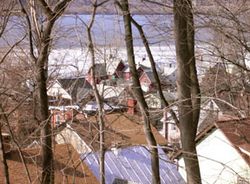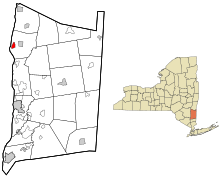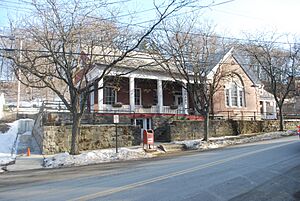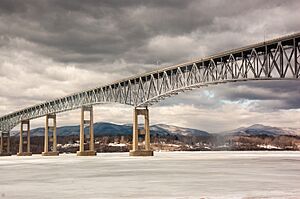Rhinecliff, New York facts for kids
Quick facts for kids
Rhinecliff, New York
|
|
|---|---|

Rhinecliff rooftops overlooking the Hudson River in winter
|
|

Location of Rhinecliff, New York
|
|
| Country | United States |
| State | New York |
| County | Dutchess |
| Town | Rhinebeck |
| Area | |
| • Total | 1.04 sq mi (2.70 km2) |
| • Land | 1.03 sq mi (2.66 km2) |
| • Water | 0.01 sq mi (0.04 km2) |
| Elevation | 55 ft (17 m) |
| Population
(2020)
|
|
| • Total | 380 |
| • Density | 370.01/sq mi (142.80/km2) |
| Time zone | UTC-5 (Eastern (EST)) |
| • Summer (DST) | UTC-4 (EDT) |
| ZIP code |
12574
|
| Area code(s) | 845 |
| FIPS code | 36-61368 |
| GNIS feature ID | 962439 |
Rhinecliff is a small community, also known as a hamlet, located right by the Hudson River in New York. It's part of the town of Rhinebeck in Dutchess County. In 2020, about 380 people lived here.
Contents
History of Rhinecliff
Rhinecliff was first settled by Europeans in 1686. Five Dutchmen, including Hendrikus and Jacobus Kip, moved here from Kingston. They called their new home Kipsbergen. At this time, England had already taken over the area, which used to be a Dutch colony called New Netherland.
How Rhinecliff Got Its Name
The Hudson River Railroad opened its Rhinebeck station in 1851. It was first at Slate Dock, then moved to Shatzell's Dock in 1852. Charles Handy Russell, a real estate developer, helped create a small village around the new station.
This village was first called Shatzellville. Then it was named Boormanville, after the railroad president James Boorman. Russell's architect, George Veitch, came up with the name "Rhinecliff." This name combines "Rhinebeck" (the nearby town) with "cliff" (for the cliffs in the area). The Rhinecliff Hotel opened around 1855. The post office officially changed its name to Rhinecliff in 1861.
Morton Memorial Library
Anna L. and Levi P. Morton owned a large estate nearby called Ellerslie. They built and gave the Morton Memorial Library to Rhinecliff. They did this to honor their daughter Lena. The library officially opened in 1908.
Geography of Rhinecliff
Rhinecliff is in the western part of the town of Rhinebeck. It is about 1 mile (1.6 km) west of Rhinebeck village. The city of Kingston is directly across the Hudson River. The closest bridge to cross the river is the Kingston–Rhinecliff Bridge. This bridge is about 4 miles (6.4 km) north of Rhinecliff.
According to the U.S. Census Bureau, Rhinecliff covers about 1.04 square miles (2.70 square kilometers). Only a small part of this area, about 0.01 square miles (0.04 square kilometers), is water.
Important Natural and Historic Areas
Rhinecliff is one of the oldest communities along the Hudson River that is still mostly unchanged. It is part of the National Register of Historic Places. This means it is recognized as important to history. It is also part of the Hudson River Historic District, which is 20 miles (32 km) long. This is the largest National Historic Landmark (NHL) in the United States.
Rhinecliff is also part of the Local Waterfront Redevelopment Program. It is known as a Scenic Area of Statewide Significance. This means it has beautiful views that are important to the whole state. The hamlet is also part of the Hudson River National Heritage Corridor. It acts as a main entrance to the larger Town of Rhinebeck by water and rail.
Landscape and Buildings
Large farms and wooded areas surround Rhinecliff to the north, east, and south. The Hudson River forms its western border. The land here has steep hills and valleys made of twisted slate rock. This natural shape influenced how the small, old houses and winding roads were built. Many buildings were constructed in the mid-1800s. However, the size of the hamlet and how many buildings it has have not changed much in the last 100 years.
| Historical population | |||
|---|---|---|---|
| Census | Pop. | %± | |
| 2010 | 425 | — | |
| 2020 | 380 | −10.6% | |
| U.S. Decennial Census | |||
Education in Rhinecliff
Students in Rhinecliff attend schools within the Rhinebeck Central School District.
Notable People from the Area
Many famous people have lived near Rhinecliff, both in the past and today. These include Levi P. Morton, Vincent Astor, Natalie Merchant, and Annie Leibovitz.
Images for kids
See also
 In Spanish: Rhinecliff (Nueva York) para niños
In Spanish: Rhinecliff (Nueva York) para niños
 | Aaron Henry |
 | T. R. M. Howard |
 | Jesse Jackson |




